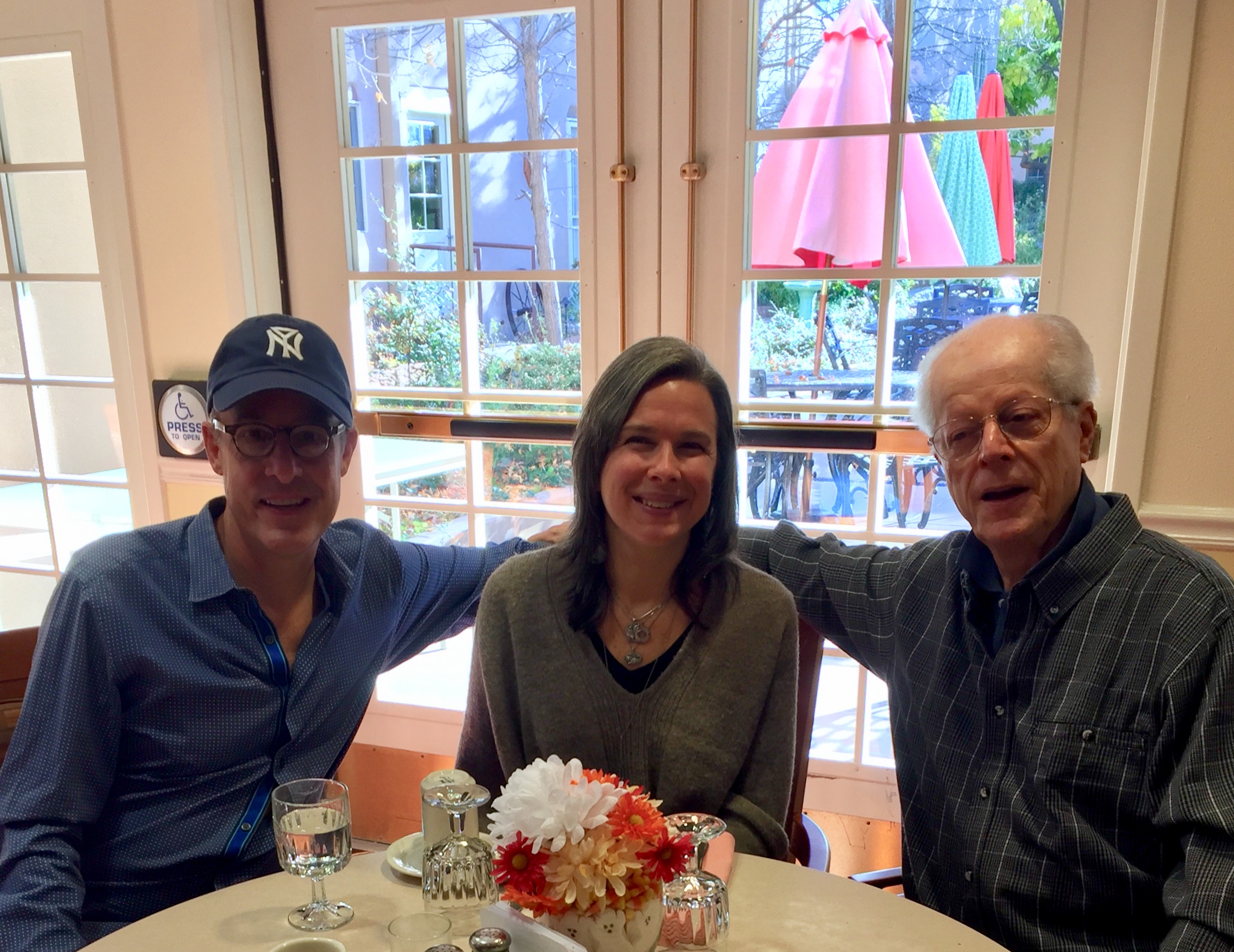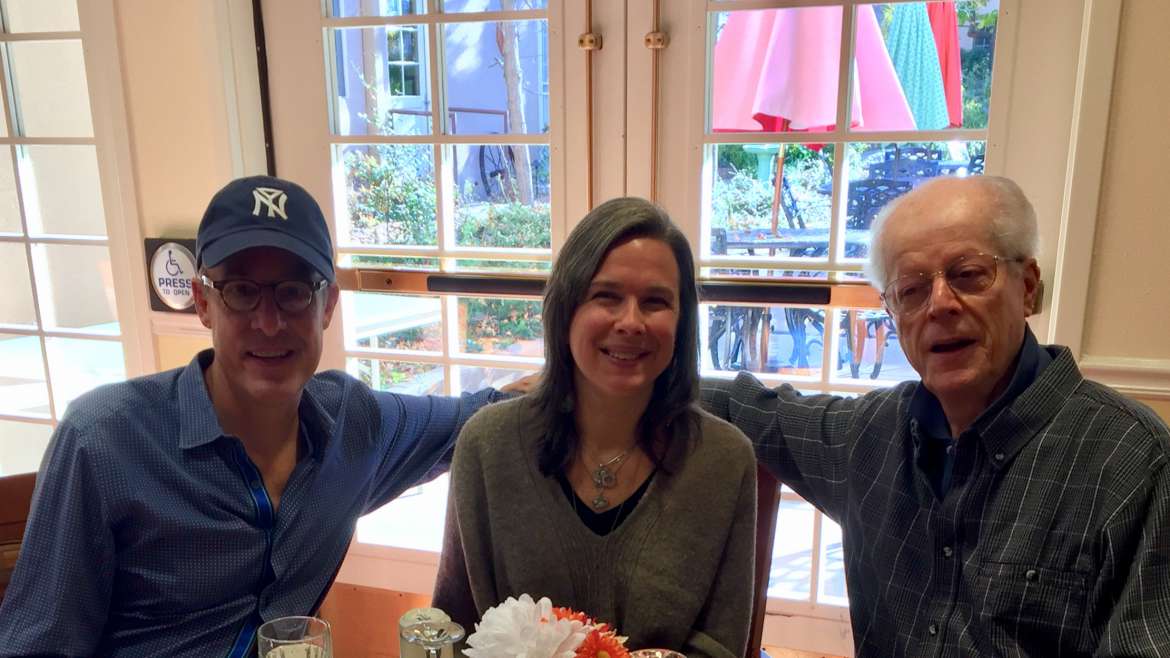John and I spent part of our autumn vacation giving retirement a test drive.
Vacation is typically synonymous with the “not working” part of retiring, so what was noteworthy was staying in a Santa Fe retirement community, living among residents up to 100 years old.
Our neighbor, Charles, began splitting his time between Brooklyn and an independent living apartment in the complex a few years back. He urged us to visit, since one of the perks of his monthly fee was occasional use of a guest apartment for visitors.
When we took him up on it, we got a peek into a culture people our age might not see unless they’re visiting parents. Charles walked us around the grounds and after only a few years as a part-time resident, he was basically mayor of the place. He greeted every resident by name, and when he introduced us to staffers, he knew their kids’ names and bought them treats for holidays.
He’d made the effort to develop new bonds after living his entire adult life in New York City. And because of that, his new life sounded like summer camp. The cantina offers margaritas every night at happy hour, the library has books and periodicals, there’s an on-site salon for haircuts, a bus takes residents grocery shopping but downtown Santa Fe is also a short walk away.
For many residents, moving into an independent living apartment probably meant downsizing from their bigger family house, maybe after the kids left and they no longer needed the extra bedrooms or maybe after upkeep felt too much. But for Charles, who lived for decades in a Brooklyn studio apartment, his one-bedroom with an all-new kitchen was bigger and nicer. I’d estimate his place was only slightly smaller than our NYC apartment. It’d be a much easier transition from here than when we moved from a three-bedroom house to Manhattan.
I might have signed a lease on the spot, if not for the small hiccup of the food, served in a dining hall and prepared low salt and on the bland side to respect residents’ medical needs. I was in Santa Fe, I wanted chiles and spice. Local cuisine was not to be found here. I expect baby boomers and foodie culture will change that well before we’re eligible to move in. They did have unlimited housemade desserts, for which I can forgive having to add my own salt.

John and I don’t have children so we’ve talked a lot about what aging looks like without kids to care for us. Similarly Charles, single and childless, said many of his neighbors either didn’t have kids or at least didn’t have kids nearby. They were making an intentional choice for themselves to trade some autonomy to get community and care.
Why does that matter? Because, as I blogged way back in 2010, retirement can actually be stressful, when you lose your routine and your sense of purpose. One of the national Health and Retirement Study‘s co-authors told HealthDay:
“There are tons of reasons why working is good for you,” said study co-author Mo Wang, an associate professor in the department of psychology at the University of Maryland. “When you work, you have a daily structure. You may do more physical activity. Working provides financial resources, social context, opportunities to interact and to learn new skills. Working can also be good for self-esteem and nurturing a sense of identity.”
An article headlined How to End the Senior Loneliness Epidemic took a broader view of how aging can make us lonely — we stop working, maybe we’re single or our spouse dies, driving might become difficult, limiting social outings and straining our sense of community and connection:
Numerous recent studies have linked loneliness with both poor health and early death. Analyzing data from the National Institute on Aging’s Health and Retirement Study in the Archives of Internal Medicine, geriatrician Carla Perissinotto of the University of California, San Francisco, found that adults age 60 or older who identified themselves as lonely were 59 percent more likely to experience decline in their ability to perform daily activities and had a 45 percent higher likelihood of dying. Over all, 22.8 percent of participants who described themselves as lonely or isolated died during the six-year study period; an additional 25 percent experienced significant declines in health. Among subjects who said they were happy or satisfied with their social lives, 14.2 percent died during the same period and 12.5 percent had major declines in health.
AARP commissioned a study of “older adults,” which they define as 45 and up — hey, AARP, thanks for considering me older — which found:
- Lonely respondents were less likely to be involved in activities that build social networks, such as attending religious services, volunteering, participating in a community organization or spending time on a hobby.
- Almost half (45 percent) of those who had lived in their current residence for less than 1 year reported feeling lonely.
- Loneliness was a significant predictor of poor health. Those who rated their health as “excellent” were over half as likely to be lonely than those who rated their health as “poor” (25 percent vs. 55 percent).
Charles showed us how to stay engaged and to choose a lifestyle that warded off loneliness. He polished the silver at his church and went to see music. He had a weekly joke dinner where he and his dinner companions traded sometimes-bawdy laughs. He made his 80s look if not always easy then certainly rich and rewarding.
On our tour, Charles showed us the adjacent assisted living and infirmary facilities. He explained that if he needed to go into a nursing home or hospice, it’s all right there. The medical team keeps an eye on you and if they think it’s time for you to move to a higher level of care, they tell you. No need for far-away family to worry whether you should be living alone any more.
Charles died a few weeks ago, in Santa Fe, cared for by the medical staff of his retirement community. It’s a huge hole in our hearts, and in our Brooklyn life, that he’s gone. We were in our apartment only a few hours when he knocked to introduce himself and to offer his cat sitting services. He was old school that way.
John loves to quote Charles, who said on the occasion of John’s 50th birthday: You’re in the prime of life. Your 40s, your 50s and your 60s. In your 70s, things start to go. In your 80s … eh.
It’s true Charles walked with a cane and wasn’t as fast and strong as he once was. But he showed us a beautiful example of how to age well, with generosity and joy and intention.


3 Comments
Sandi
This is a lovely article Colleen, and one I would like to see more of.
I feel that our country is going to be in crisis in a few years given the number of baby boomers who are becoming less independent and more infirmed.
I am glad that Charles got to live/split his time between the two homes, one with neighbors such as yourself in a building where it seems you look out for one another, and the independent living community out west.
I am going through some health issues with my own mother, and we are indeed going through many of the issues mentioned: downsizing, loss of indepence, feelings of isolation, loss of friends and community. It goes on and on.
It has been a very frustrating process to see the hoops my mother has been trying to jump through in order to get assistance with activities of daily living (grocery shopping, bathing, etc), and in NYC simple things like bathing can become a very difficult task if one has a prewar bathroom and can’t step into a tub in order to take a shower.
I have been in health care for over twenty years, and I have been pretty shooked at the wake up call I have been given just helping my mother. Thankfully she has a few very amazing neighbors who have helped her, and she is now with me.
It would be interesting to see some more in-depth articles that perhaps chronicle this transitional period some elderly folks have gone through, especially ones from different socioeconomical backgrounds.
Tommy F.
I love the idea of taking retirement for a “test drive”! I unfortunately am too young to start this process, but my mom is thinking about retiring in the next few years. She already has a medical alert system (https://www.alert-1.com/), so why not complete the picture, at least for fun!
Leave a reply